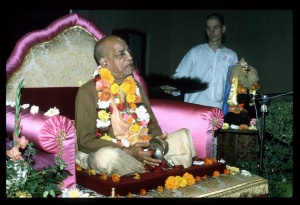SB 10.16.51: Difference between revisions
m (1 revision(s)) |
No edit summary |
||
| Line 1: | Line 1: | ||
{{info | {{info | ||
|speaker=wives of the | |speaker=wives of the Kāliya serpent | ||
|listener=Lord | |listener=Lord Kṛṣṇa the Supreme Personality of Godhead | ||
}} | }} | ||
[[Category:Srimad-Bhagavatam - Canto 10 Chapter 16]] | |||
[[Category:Bhagavatam Verses Spoken by the Wives of the Kaliya Serpent - Vanisource|101651]] | |||
<div style="float:left">'''[[Srimad-Bhagavatam]] - [[SB 10|Tenth Canto]] - [[SB 10.16: Krsna Chastises the Serpent Kaliya|Chapter 16: Kṛṣṇa Chastises the Serpent Kāliya]]'''</div> | |||
<div style="float:right">[[File:Go-previous.png|link=SB 10.16.50]] '''[[SB 10.16.50]] - [[SB 10.16.52]]''' [[File:Go-next.png|link=SB 10.16.52]]</div> | |||
{{RandomImage}} | |||
{{SBnotice}} | |||
==== TEXT 51 ==== | ==== TEXT 51 ==== | ||
<div | <div class="verse"> | ||
aparādhaḥ sakṛd bhartrā | :aparādhaḥ sakṛd bhartrā | ||
soḍhavyaḥ sva-prajā-kṛtaḥ | :soḍhavyaḥ sva-prajā-kṛtaḥ | ||
kṣantum arhasi śāntātman | :kṣantum arhasi śāntātman | ||
mūḍhasya tvām ajānataḥ | :mūḍhasya tvām ajānataḥ | ||
</div> | </div> | ||
| Line 17: | Line 22: | ||
==== SYNONYMS ==== | ==== SYNONYMS ==== | ||
<div | <div class="synonyms"> | ||
''aparādhaḥ''—the offense; ''sakṛt''—just once; ''bhartrā''—by the master; ''soḍhavyaḥ''—should be tolerated; ''sva-prajā''—by Your own subject; ''kṛtaḥ''—committed; ''kṣantum''—to tolerate; ''arhasi''—it is befitting for You; ''śānta-ātman''—O You who are always peaceful; ''mūḍhasya''—of the foolish one; ''tvām''—You; ''ajānataḥ''—who does not understand. | |||
</div> | </div> | ||
{{SBcollapse}} | |||
==== TRANSLATION ==== | ==== TRANSLATION ==== | ||
<div | <div class="translation"> | ||
At least once, a master should tolerate an offense committed by his child or subject. O supreme peaceful Soul, You should therefore forgive our foolish husband, who did not understand who You are. | At least once, a master should tolerate an offense committed by his child or subject. O supreme peaceful Soul, You should therefore forgive our foolish husband, who did not understand who You are. | ||
</div> | </div> | ||
| Line 31: | Line 36: | ||
==== PURPORT ==== | ==== PURPORT ==== | ||
<div | <div class="purport"> | ||
Because of their extreme anxiety, in this verse Kāliya's wives mention the same idea twice: that the Supreme Lord should kindly forgive their foolish husband. The Supreme Lord is śāntātmā, the supreme peaceful Soul, and therefore the Nāga-patnīs suggest it would be proper for Him to overlook, at least this once, the great offense committed by the ignorant Kāliya. | Because of their extreme anxiety, in this verse Kāliya's wives mention the same idea twice: that the Supreme Lord should kindly forgive their foolish husband. The Supreme Lord is ''śāntātmā'', the supreme peaceful Soul, and therefore the Nāga-patnīs suggest it would be proper for Him to overlook, at least this once, the great offense committed by the ignorant Kāliya. | ||
</div> | </div> | ||
__NOTOC__ | </div> | ||
</div> | |||
<div style="float:right">[[File:Go-previous.png|link=SB 10.16.50]] '''[[SB 10.16.50]] - [[SB 10.16.52]]''' [[File:Go-next.png|link=SB 10.16.52]]</div> | |||
__NOTOC__ | |||
__NOEDITSECTION__ | |||
Revision as of 05:18, 21 May 2021

A.C. Bhaktivedanta Swami Prabhupada
Please note: The synonyms, translation and purport of this verse were composed by disciples of Śrīla Prabhupāda
TEXT 51
- aparādhaḥ sakṛd bhartrā
- soḍhavyaḥ sva-prajā-kṛtaḥ
- kṣantum arhasi śāntātman
- mūḍhasya tvām ajānataḥ
SYNONYMS
aparādhaḥ—the offense; sakṛt—just once; bhartrā—by the master; soḍhavyaḥ—should be tolerated; sva-prajā—by Your own subject; kṛtaḥ—committed; kṣantum—to tolerate; arhasi—it is befitting for You; śānta-ātman—O You who are always peaceful; mūḍhasya—of the foolish one; tvām—You; ajānataḥ—who does not understand.
Translation and purport composed by disciples of Śrīla Prabhupāda
TRANSLATION
At least once, a master should tolerate an offense committed by his child or subject. O supreme peaceful Soul, You should therefore forgive our foolish husband, who did not understand who You are.
PURPORT
Because of their extreme anxiety, in this verse Kāliya's wives mention the same idea twice: that the Supreme Lord should kindly forgive their foolish husband. The Supreme Lord is śāntātmā, the supreme peaceful Soul, and therefore the Nāga-patnīs suggest it would be proper for Him to overlook, at least this once, the great offense committed by the ignorant Kāliya.